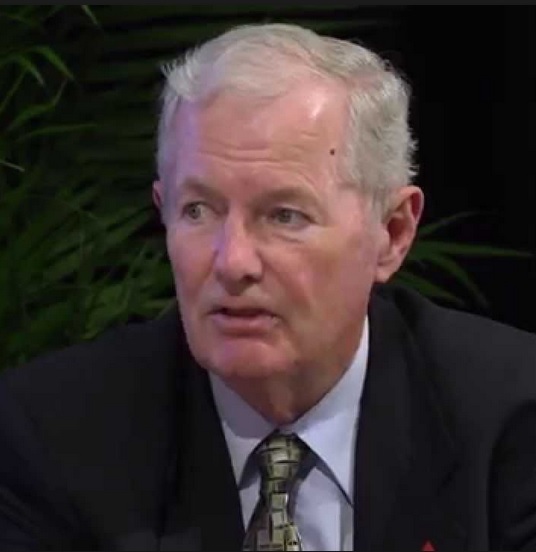NRA Leaders
Member Profile

Allan Cors
President
Biography
Cors earned his bachelor’s degree and law degree from the University of Cincinnati and went to work as a counsel with the Judiciary Committee in the U.S. House of Representatives. He then served as Corning’s Director of Government Affairs and Senior Vice President for 34 years. A lifelong hunter and competitive shooter with a passion for collecting World War II military vehicles, Cors has served as president of the NRA Foundation and is a member of the NRA’s Executive Committee. He was a principal advocate for the establishment of NRA’s Political Action Committee. Cors was elected President of the National Rifle Association in April 2015. Cors, now retired, was a senior vice president with Corning, Inc., where he directed the company’s government affairs programs worldwide.
All Statements (4 total)
- Writing in the April 2016 edition of America’s 1st Freedom, Cors considered the possibility of a future President Hillary Clinton nominating former-President Barack Obama for a seat on the U.S. Supreme Court. "I suspect that Obama's colossal, all-smothering ego would welcome the offer if President Hillary Clinton...were to make it. Obama's sense of hubris runs his life."
2016-04-01
- In an interview with the NRA’s American Rifleman magazine from September 17, 2015, Cors lamented the passage of the 1968 Gun Control Act, recalling, “The real problem came in 1967 when President Lyndon Johnson—taking a terrible beating over his Vietnam War policy—needed a major diversion and took on gun control as a way to recover his mark as President ... I got a call at six o’clock in the morning [on June 5, 1968] from [former Michigan Congressman] John Dingell with the news that presidential candidate Senator Bobby Kennedy had been assassinated [with a handgun]. And we both knew that we would not be able to hold it back after this.” The landmark Gun Control Act of 1968 established categories of persons who are prohibited from purchasing or possessing firearms, including convicted felons and those who have been “adjudicated as a mental defective or…committed to any mental institution.” The GCA also established the federal firearms license (FFL) process to screen and monitor those “engaged in the business” of dealing firearms. Prior to the 1977 “Cincinnati Revolt,” the leadership of the NRA was primarily concerned with marksmanship and recreational shooting, and the organization supported the Gun Control Act.
2015-09-17
- In an editorial in the June 2015 issue of America’s 1st Freedom, Cors wrote, “As a young attorney, I served as minority counsel for the House Judiciary Committee [in the 1960s]. Universal, national gun control to most of us was a totally unacceptable, foreign concept. My civil disarmament counterparts on the majority side were the opposite. They and their bosses—along with their allies in the U.S. Senate, the Department of Justice and President Lyndon Johnson’s White House—were motivated by a kind of hatred of gun owners that none of us had seen before. Allied with those zealots was a coalition of 32 organizations, brought together by U.S. Attorney General Ramsey Clark, called the National Council for a Responsible Firearms Policy. With the intensely active assistance of the White House, that lobby—headed by astronaut John Glenn—created a mob of anti-gun media. Glenn (later a U.S. senator) and his cohorts were pushing for universal gun owner registration and licensing, and prohibitive controls on all legal firearm commerce.” Cors was referring to the legislative push that ultimately resulted in the 1968 Gun Control Act. This landmark law established categories of persons who are prohibited from purchasing or possessing firearms, including convicted felons and those who have been “adjudicated as a mental defective or…committed to any mental institution.” The GCA also established a federal firearms license (FFL) process to screen and monitor those “engaged in the business” of dealing firearms. Prior to the 1977 “Cincinnati Revolt,” the leadership of the NRA was primarily concerned with marksmanship and recreational shooting, and they supported the Gun Control Act.
2015-06-01
- On April 16, 2015, in an interview with NRA News, Cors appended the NRA's "Stand and Fight" slogan, declaring, "'Stand and Fight,' as we say, or die." Cors also made false claims about a new universal background check law in the state of Washington. The law was adopted after Washington voters overwhelmingly approved it as a ballot measure during the November 2014 elections. During the interview, Cors wrongly claimed that merely handing someone a gun without a background check would now be a crime in Washington. In truth, the law only pertains to sales/permanent transfers of firearms. Cors also added that he did not do enough to oppose the passage of the Gun Control Act of 1968. The landmark law established categories of persons who are prohibited from purchasing or possessing firearms, including convicted felons and those who have been “adjudicated as a mental defective or … committed to any mental institution.” The Gun Control Act of 1968 also established the federal firearms license (FFL) process to screen and license those “engaged in the business” of dealing firearms.
2015-04-16
Statements by Category (4 total)
Sources [1]
Sources [1]
Sources [1]
Sources [1]